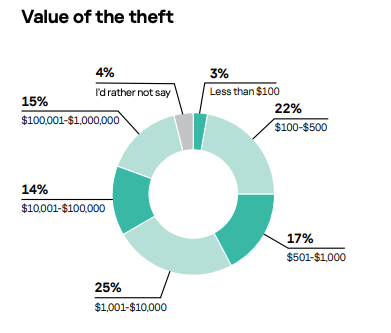A third of Americans who own or have owned cryptocurrency have fallen victim to scams and theft, according to a recent survey by cybersecurity firm Kaspersky.
The survey released by the security firm found that a third of respondents have had their crypto assets stolen, with the average value of the theft being $97,583.

Additionally, a third of respondents have fallen victim to a fraudulent crypto-related website or investment scam, with 19% experiencing identity theft and 27% having payment details stolen and money taken from their bank account, the survey found.
Noting significant age differences in crypto ownership and theft, 36% of respondents aged 25-44 said that they own cryptocurrency or crypto assets, compared to just 10% of respondents aged 55+. Furthermore, nearly half (47%) of respondents aged 18-24 said they have had cryptocurrency or a crypto asset stolen, while just 8% of respondents aged 55+ said the same.
In terms of protection measures, the survey found that 24% of respondents currently own cryptocurrency or other crypto assets, and on average, respondents said the last time they checked on their crypto investments was six weeks ago.
However, 32% of respondents who own or have owned cryptocurrency or other crypto assets said they have lost access to a crypto-related account, and only 34% use multi-factor authentication to protect their accounts, while only 14% said they store seed phrases and private keys for their crypto.
Kaspersky–a firm that provides online and crypto security–advises users to be careful where they invest their money and to keep a close eye on phishing scams and fake websites.
Read more: Scam warning: Circle phishing campaign promises fake USDC DeFi swap
Kaspersky also recommends employing any extra security measures that are available, such as multi-factor authentication and using strong, unique passwords across all accounts, there are still other tools and methods people can use to keep their crypto safe.
While Kaspersky advises users to be vigilant and use any extra security measures available, other experts recommend using cold-storage wallets to mitigate the risk of crypto theft.
Ultimately, the survey highlights the need for increased awareness and caution when investing in cryptocurrency, be it backing up your seed phrases or more advanced methods like using cold-storage wallets, self-custody, and the principles of it are crucially important when it comes to safely storing crypto.



